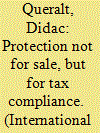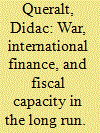| Srl | Item |
| 1 |
ID:
157359


|
|
|
|
|
| Summary/Abstract |
How do rulers raise taxes when the fiscal capacity of the state is weak? I argue that, in conditions of low fiscal capacity, rulers might secure high tax yields by granting protection from competition to key domestic producers. I offer qualitative evidence of this exchange in the developing world today and test the theory against a sample of thirty-two developing states in Latin American, Eastern Europe, and the former Soviet Union circa 2005. Results indicate that, conditional on poor fiscal capacity, declining industries pay higher taxes (or evade less) if governments grant them tariff protection from international competitors. The results add to recent scholarship that studies the conditions under which entry barriers—which are otherwise inefficient institutions—result in second-best solutions for states whose capabilities are still consolidating. My findings suggest that trade protection does not always stem from rent-seeking by government. This article therefore offers a new, alternative hypothesis to canonical models in international political economy.
|
|
|
|
|
|
|
|
|
|
|
|
|
|
|
|
| 2 |
ID:
169318


|
|
|
|
|
| Summary/Abstract |
In this article I revisit the relationship between war and state making in modern times by focusing on two prominent types of war finance: taxes and foreign loans. Financing war with tax money enhances the capacity to assess wealth and monitor compliance, namely fiscal capacity. Tax-financed war facilitates the adoption of power-sharing institutions, which transform taxation into a non-zero-sum game, carrying on the effect of war in the long run. Financing war with external capital does not contribute to long-term fiscal capacity if borrowers interrupt debt service and, as part of the default settlement, war debt is condoned or exchanged for nontax revenue. The empirical evidence draws from war around the world as early as 1816. Results suggest that globalization of capital markets in the nineteenth century undermined the association between war, state making, and political reform.
|
|
|
|
|
|
|
|
|
|
|
|
|
|
|
|